Part 6 of the 10-part EDST Dissertation Training Series
By Ella Wright | Blog Editor, EDST | Insights from Dr. Autumn Knowlton
More Than Just a Chapter
When students hear the word methodology, many think of a checklist: interviews, surveys, coding software, done. But Dr. Autumn Knowlton reminded us that methodology is much more than methods. It is about how you think knowledge is created, and how you position yourself in that process.
This chapter is where you show the reader how your study works—from your assumptions about knowledge, to your ethical choices, to the tools you used to collect and analyze data.
“You are not just reporting what you did. You are explaining how and why you did it, and how your choices shaped the outcomes.”
Methodology vs. Methods: Know the Difference
- Methodology is the approach to knowledge creation—it includes your beliefs about what counts as knowledge, how you gather it, and how you make meaning.
- Methods are the specific tools or processes you used—such as interviews, surveys, focus groups, or document analysis.
Think of methodology as the framework for how you see the world as a researcher, and methods as how you act within that world to answer your question.
Align Your Question with Your Methods
Your research question should guide your methods, and your methods should allow you to answer the question. For example:
- A quantitative approach seeks generalizable, measurable patterns.
- A qualitative approach explores meaning, experience, and nuance.
- Mixed methods use both to complement each other.
Tip: Be clear about what you are trying to find out—and choose methods that fit.
Ethics Is More Than a Form
Many students think of ethics as the form they submit to the research ethics board. But ethics in your dissertation also includes:
- How you treat people and knowledge in your study.
- How you refer to participants (e.g., co-researchers, collaborators).
- How you acknowledge power, bias, and positionality.
Dr. Knowlton encouraged us to go deeper:
“Ethics is about care, respect, and trust. How are you showing the reader that your process is trustworthy?”
Positionality and Self-Location: Who Are You as the Researcher?
You are not a neutral observer. In this chapter, you explain:
- Who you are in relation to the research.
- What assumptions and biases you bring.
- How you handled your presence in the data.
You might include reflections such as:
- Did you keep a research journal?
- Did you share findings with participants for feedback?
- How did your identity influence your interactions and interpretations?
“Trustworthiness means showing that your findings are not random or accidental. They came from a process your reader can trust.”
Writing With Integrity
Dr. Knowlton encouraged students to be intentional about their voice in this chapter. If you use “I” or “we,” explain why. Footnotes can help clarify your choices.
Be consistent with your ontological and epistemological assumptions. In other words:
- How do you see the world?
- What counts as knowledge in your study?
- Who creates that knowledge?
Answering these questions helps you write a clear, ethical, and honest methodology.
Key Takeaways
- Methodology is about how you create knowledge—not just tools.
- Align your question, methodology, and methods.
- Ethics is about care, trust, and positionality—not just forms.
- Show who you are in the research and how that shaped your process.
- Build trustworthiness by explaining how you ensured valid, thoughtful analysis.
Explore the Full Dissertation Training Series
- Overview Post – About the Workshops and Series
- Part 1 – Not a Book, Not a Mystery: What Your Dissertation Really Is
- Part 2 – From Jumble Sale to Funnel: Planning Your Dissertation for Clarity and Flow
- Part 3 – Hold the Target, Not the Dart: Crafting and Evolving Your Research Questions
- Part 4 – Conversations, Not Catalogues: Writing a Literature Review with Purpose
- Part 5 – Kitchen Rules: Conceptual and Theoretical Frameworks Explained
- Part 6 – You Are the Method: Positionality, Ethics, and Making Knowledge
- Part 7 – Sock Time: Presenting Your Findings with Clarity and Confidence
- Part 8 – Weaving the Threads: Discussion and Meaning-Making
- Part 9 – What I Did, Why It Matters: Writing Your Scholarly Conclusion
- Part 10 – Don’t Go in Circles: Writing, Editing, and Staying Sane
Resources
Dissertation Preparation and Policies
- UBC Grad Studies – Getting Started:
https://www.grad.ubc.ca/current-students/dissertation-thesis-preparation - Style Guides and Computer Tools:
https://www.grad.ubc.ca/current-students/dissertation-thesis-preparation/style-guides-computer-tools
Writing Support and Self-Guided Modules
- EDST Thesis Writing Module:
https://thesismodules.edst.educ.ubc.ca/ - Developing a Dissertation (EDST Module):
https://thesismodules.edst.educ.ubc.ca/module-library/developing-a-dissertation/ - UBC Library Dissertation Guide:
https://guides.library.ubc.ca/dissertation
Free One-on-One Writing Support
- UBC Writing Consultations for Graduate Students (writing and referencing help):
https://writing.library.ubc.ca/graduates/writing-consultations/
Workshop Recording and Presenter
- Click to view Dr. Autumn Knowlton’s workshop presentation slides.
- Dr. Autumn Knowlton – (Re)Visions Website: https://www.autumnrevisions.com/
Explore More
UBC EDST students can access free tools and support through the Thesis Writing Module and the Developing a Dissertation module. For writing and referencing help, book a free graduate writing consultation.


Leave a Reply